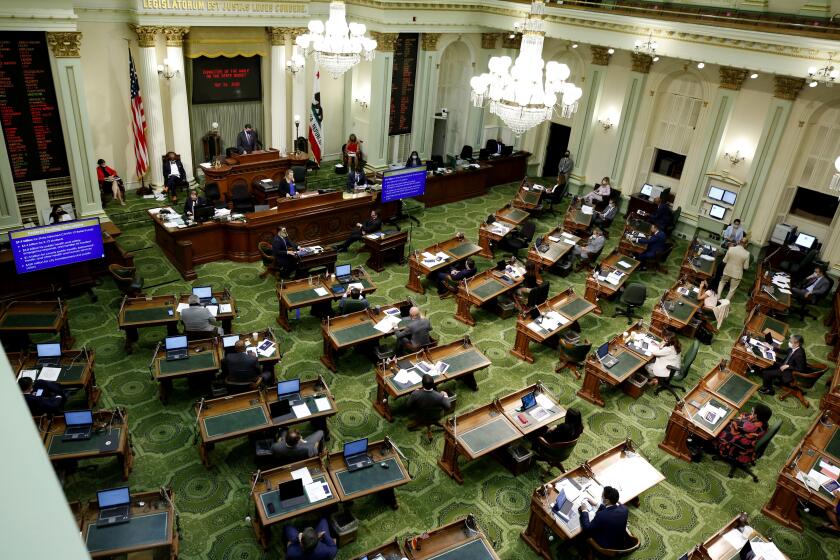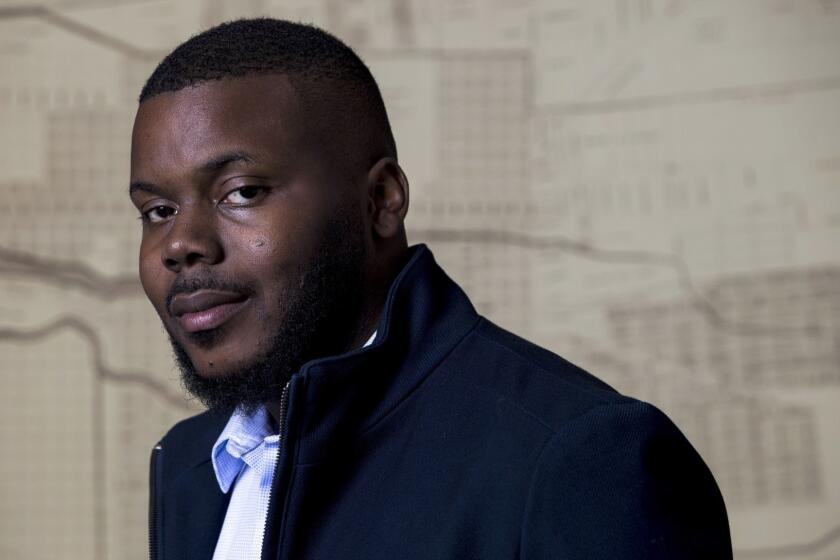In Palm Springs, guaranteed income program for transgender residents mulled

- Share via
The city of Palm Springs will allocate $200,000 to develop a guaranteed income pilot program for transgender and nonbinary residents.
City Council members voted unanimously Thursday to pay DAP Health and Queer Works to design the program and apply for state funding, the first of three phases outlined in a city report to bring the proposed project to fruition. The decision arrives amid a flurry of nationwide legislation aimed at restricting the rights of transgender youths.
Council Member Christy Holstege, who brought the matter to the meeting, said Monday that she felt “incredibly proud” of the city for coming down on “the right side of history and supporting our trans and nonbinary, gender-nonconforming community.”
Like other guaranteed income programs, the pilot would provide direct cash payments to individuals to spend as they see fit. That sets it apart from some financial assistance programs that come with work requirements or specify how the money can be spent. Proponents say these types of programs promote physical and psychological well-being by giving some of society’s most marginalized groups a financial life vest.
Mayor Aja Brown says the pilot program, which is to begin later this year, will be the biggest of its kind in the nation.
At the meeting, Queer Works Chief Executive Jacob Rostovsky said the program would provide monthly payments of $600 to $900 to 20 participants who identify as transgender or nonbinary. Another 20 participants would serve as a control group and receive social services that are built into the program, but not the monthly payments. According to those behind the project, the transgender and nonbinary community is particularly vulnerable to unemployment, homelessness, discrimination and assault.
“This is a chance to help individuals receive money that we can think of as a subsidy — to subsidize the gap in income that the trans and nonbinary community faces due to having some of the highest levels of unemployment in this country,” Rostovsky, who is transgender, said at Thursday’s meeting.
Queer Works is a Coachella Valley-based nonprofit aimed primarily at addressing disparities faced by transgender, nonbinary and intersex people. DAP Health is a nonprofit resource in the valley for those with, affected by or at risk for HIV or AIDS.
Galvanizing the request is the state’s commitment to providing $35 million in funding for guaranteed income pilot programs. The state’s plan, approved last year, targets pregnant women and young adults who have aged out of the foster care system. Rostovsky said they’ve been “highly encouraged” to apply for a piece of the funding, noting that 5% of foster youths identify as transgender.
The California Legislature, by unanimous votes, has approved the nation’s first state-funded guaranteed income program.
The proposal also fits with an effort by a national coalition called Mayors for a Guaranteed Income, which Holstege said she joined when she was mayor last year. The coalition was founded by former Stockton Mayor Michael Tubbs, who touched off a national conversation — and copycat experiments — when he launched a guaranteed income program in his city in 2019.
A guaranteed income program is underway in Compton, a city with nearly twice the population of Palm Springs. Discussion may have reached a fever pitch when 2020 presidential candidate Andrew Yang ran on a platform centered on a type of guaranteed income, known as Universal Basic Income, making sound bites out of a once-obscure concept.
Despite the buzz, not all Palm Springs leaders have confidence in the programs. Mayor Lisa Middleton expressed doubt that guaranteed income programs will be able to achieve their lofty aims.
Middleton, who is transgender, stressed that the needs for assistance within the community are “absolutely real.” But given the number of people struggling and finite resources, she said she didn’t see it penciling out. According to Middleton, there are over 400,000 people living below the poverty line in Riverside County.
“My serious concern is the ability of these guaranteed income programs to scale up to the magnitude of the issues that are before us,” Middleton said.
Stockton Mayor Michael Tubbs says that for way too long, his city has been known for headlines about bankruptcy, violent crime and the housing collapse.
However, she ultimately voted in favor of the program, noting her underlying support for the work being done by DAP Health and Queer Works for marginalized communities.
“I have been wrong many times,” Middleton said. “I could be wrong again on this one.”
At this point, the pilot program still needs more funding to fully launch. When reached Monday, Rostovsky said some of the details concerning the program discussed at the recent council meeting — including a total reported budget of $1.8 million — were preliminary figures.
Besides state funding, the partnership seeks philanthropic support and could come back to the city to ask for more money — which several council members said they might not be willing to allot.
Over the next three to six months, Rostovsky said the partnership will work on putting together an application, seek input from local transgender and nonbinary leaders and conduct outreach.
More to Read
Sign up for Essential California
The most important California stories and recommendations in your inbox every morning.
You may occasionally receive promotional content from the Los Angeles Times.














